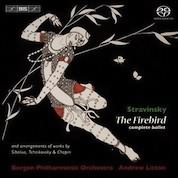Andrew Litton’s previous disc of Petrushka and The Rite of Spring was sensational, and this Firebird is just as fine. Timing out at about 47 minutes, you might think the tempos somewhat slow, but they’re not, or at least they never sound so. The Infernal Dance is brilliantly played, with exciting, hard-hitting rhythms. Indeed, Litton’s control of rhythm, allied to remarkably clear textures even in the most thickly scored passages, is what keeps the music flowing effortlessly, even in those grotty-sounding pantomime passages that link together the more extended set numbers.
Musical scholars have long praised these “in between” moments as containing the most texturally and harmonically fascinating music in the ballet, but the problem is that the addition of the more lyrical, folk-inspired formal dances turns the work into a sort of raisin pumpernickel: lots of bread separating bits of fruit. That’s why Stravinsky jettisoned most of this filler when assembling the various suites. The best performances, though, manage to pace the music so that the entire work sounds like an integrated whole, and that’s what Litton and his Bergen forces achieve. Another small but telling point: the offstage trumpet parts are included in the finale (as with Dohnányi), and they add just that much festive brilliance to the closing pages. There’s no point in discussing individual details further, you have to hear the performance whole.
The couplings also are very imaginative and a welcome change from the usual short Stravinsky items. You get Stravinsky’s arrangement of Tchaikovsky’s Bluebird Pas-de-deux, Sibelius’ Canzonetta, and two works by Chopin–the Nocturne Op. 32 No. 1, and the Grande Valse Brilliante Op. 18. As with The Firebird, the performances are ideal: ideally paced, limpid in texture, and immaculately played. Stravinsky’s Greeting Prelude concludes this really captivating programming. As usual with recordings from this source, the engineering is state of the art. A great disc.
































